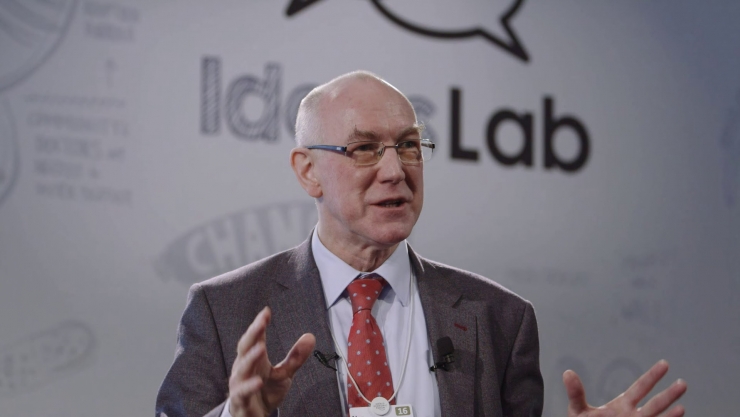
Image credit: RoboHub
Robots, and their impact on the economy, left a deep impression on everyone. Can robots increase productivity and employment, improve society, and share wealth? To answer these questions, we discussed the robotic economy with three European experts. In this interview, we invited Alan Winfield, professor of Bristol Robotics Laboratory and expert in robot management and ethics. He is often invited to explore the role of robots in society, including at the World Economic Forum, the Royal Society and the Royal Institute of Engineering.
How do you think robots will affect the economy?It must be a positive effect. But the debate around robotics and employment is too polarized. People seem to have to choose which side to agree to, or believe that "the robot will steal our jobs," or believe that "everything will be wonderful, and new job opportunities will exceed the lost old jobs." Our point is that there is no one-size-fits-all answer to this question. The degree to which robots work in place of humans depends on the specific robot and the specific job. You need to exclude the factors of the big environment according to the specific circumstances. This is a rather delicate question. Therefore, it is difficult to say clearly. On average, the overall number of jobs will increase and say less.
Can you give a concrete example of the impact of robots on employment?My bigger worry is artificial intelligence, not hardware robots. Knowledge workers (lawyers, call center workers, translators, data analysts, etc.) are more threatened by artificial intelligence than physical workers by hardware robots. Robotics are more difficult to achieve maturity and implementation. And we can imagine the use of robots in the scene, we really need almost all of the collaborative robots that work with humans. That's because the physical work we do is not fully automated. Fully automated work - such as assembly line production - has been automated.
We should also think about areas that are suitable for automation. Warehouses and logistics are an area where robots are already working. We have seen examples of Kiva and Amazon, but there is still a long way to go. Of course, this is usually a low-paying job and it is very exhausting. I can also think of robots playing a big role in precision agriculture, crop harvesting, and harvesting. At the same time, we do not want people to lose their jobs.
If people are unemployed, how can we help people through the transition period?I think there may be taxation for automation or redeployment. Companies that cut large-scale low-income employees due to automation are obliged to those employees. If the company does not actively — and generously — help these people by re-deploying or training, the government should step in. The last resort is special taxation.
There is also much controversy surrounding self-driving vehicles and their impact on the economy. What do you think?We have to see that autopilot vehicles and trucks are on the road and it is estimated that there will be a long time before the technology is fully prepared. We have come back to this crucial question: Does the car need human help or is it fully automated? The recent death of Tesla made us see that it is not a good idea to require human involvement. If you don’t have anything to do, it’s hard to focus on the road completely, so if you let a human driver get out of hand and restore control of the car at any time, this idea is not reliable; this is still unsolvable. problem. Tesla accident also let us see that the sensory system of the robot is not good enough, and there are still many roads and highways. Due to the weakness of sensing and cognition, the robot will not be able to figure out what happened.
What is the positive effect of robots on society?In the short-term future, robots will create new types of job opportunities. The lesson learned from the digital society in the past 20 years is that it is difficult to predict what these new jobs will be. If we sit down to discuss the Internet in 1996, I doubt whether we can guess about 10% of IT-related work today. The key is that new technologies bring new possibilities for people's creativity. We obviously need more people to maintain the robot, but there will be many new business and entrepreneurial activities in the future. We have already seen this in our incubator. Think of Open Bionics, they print 3D prostheses. Who ever thought that 3D printing technology can be used like this! As technology improves, there will be many wearable robots in the future. Moreover, the object of service is not only the person who loses the body, but also the elderly and the disabled. I sincerely hope that wheelchairs can be the past.
In the long run, it is very important that the wealth created through robots can be shared by all people. Basic national income is the only reasonable solution. In the end, I mean that in the next hundred years or so, it would be great to live in a scarce society. Basically all humans do not want to do the work done by robots. We should look forward to a future society where there is no work that disrespects people or causes serious physical or mental exhaustion. This allows us to carry out sports, art, book writing, scientific research and other activities. My "robot Utopia" is similar to the "Star Trek" society. Work is basically a voluntary activity. Robots can help us achieve this ideal, but the premise is that social wealth is shared by all. What we really need to ensure is that wealth will not be unique to companies that create robots, or those who have "0.1%" of these companies. If we fail to do this, we may face poverty and inequality. If people can't afford what robots can do, what's the point?
There are many misinformation about the robot economy. How can we improve public awareness?We must point out that artificial intelligence (software type) and robot are different. In public perception, the two are often confused.
Also, pay attention to the subtlety. We are not talking about robots replacing people's work, but robots do some tasks. Many jobs contain parts that robots cannot perform. A typical example is elderly care workers. If you ask people, "Would you like to see the robot in the nursing home?" They tend to say unwillingly. But if you change a question, for example, if you are willing to robot support someone to complete personal hygiene care, then you may get different answers. People think this is good because it brings back dignity. In my opinion, the advantage of robots in nursing homes is that they liberate human care workers and can provide human emotional care, such as spending time talking to people. When I chatted with a carer, they found that they loved caring and they hated the regular work of managing people's physiological needs. This made them less able to sit and chat. This is a good example. Let us see that the correct division of work is actually very positive for service providers and consumers.
Who should decide which robotic applications are economically beneficial?The whole society should have the right to speak on this issue - there must be a dialogue. This is already underway in European polls and various European events. In addition, I think there should also be an organization that specifically considers such issues. It can be a Royal Council or an EU organization that draws on suggestions from the entire society to understand how the ordinary people deal with these issues — we are talking about subtle issues, not the non-black and white issues that the media often renders. Businesses also have responsibilities in them. In the end, they need to be accepted by the society, or should be reflected in the system control and standards. In fact, the British Standards Institute recently released a new set of ethical guidelines: "BS8611, robotics and robotic equipment. Guidelines for the ethical design and application of robots and robotic systems."
If a company wants to succeed, they should work hard to get the government's "seal" certification and prove that their robots meet the relevant standards. Regulations and regulations are the government's way to make people feel at ease. Why do we believe in airlines? Because this industry has very strict standards and agreements to investigate accidents. Lessons from the airline can be transferred to the robotics industry. Tesla is an example of how we need regulations. To the best of our knowledge, there are no published standards that can be used to confirm their Autopilot system - there is no way for people to trust this system until a corresponding standard appears.
This is the first in a series of interviews with robotics economists. The next interviewee will be Professor Prof. Alan Manning of the London School of Economics.
Via RoboHub
Xinzhi created Lei Fengwang (search for "Lei Feng Net (search for "Lei Feng Net" public number concerned) "public number attention" under the focus of the robot's public number, we are concerned about the status quo and future of robots, and associated with the robot industry. Interested friends can add micro signal AIRobotics, or directly scan the QR code below to follow!
